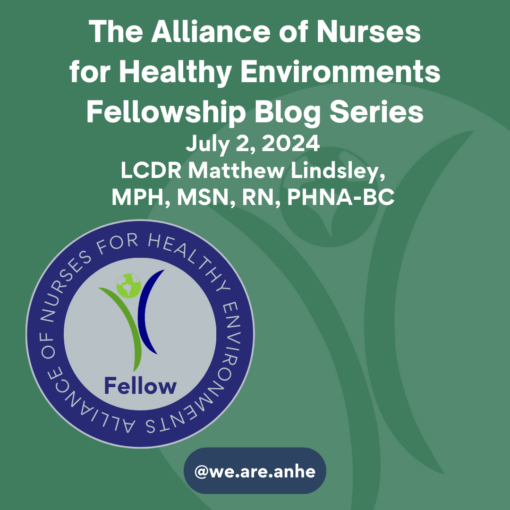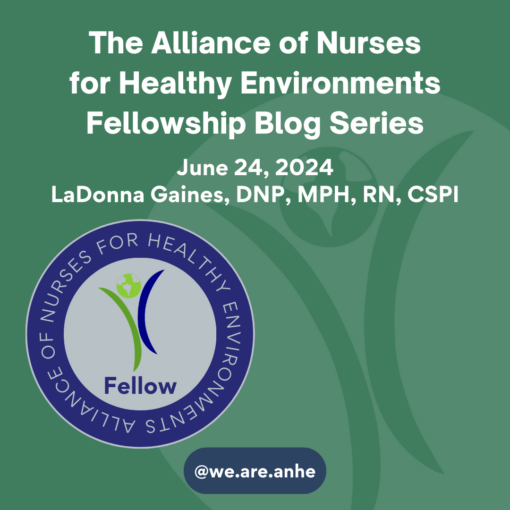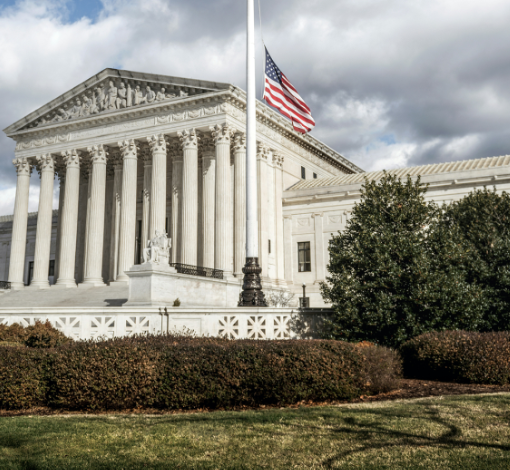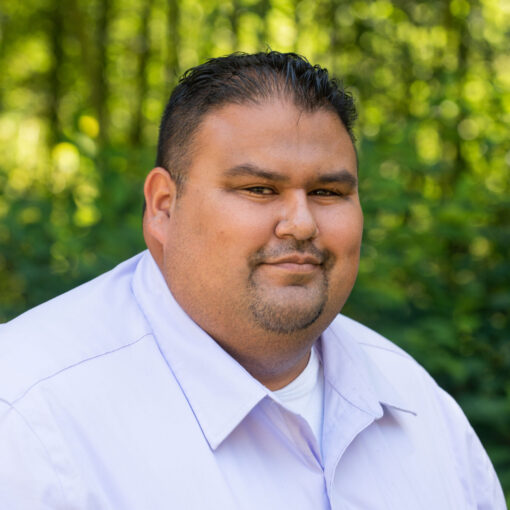This blog series follows the national nursing organization members of the Nursing Collaborative on Climate Change and Health. The Nursing Collaborative, formed in partnership with the Alliance of Nurses for Healthy Environments and Climate for Health, is a combined effort among nursing organizations to build visible leadership on climate as a health priority. This nationwide network of organizations will be instrumental in moving the profession forward in addressing climate change, creating a climate literate nursing community, engaging all stakeholders in connecting climate and health, and building collective support and action for solutions. Learn more about the Nursing Collaborative here.
 September’s blog post features the three Presidents of the Association of Public Health Nurses (APHN): Lindsay Huse, BSN, MPH, PHNA-BC, President; Ivonne Rivera-Newberry, MPH, BSN, RN, Past-President; and Zenobia Harris, DNP, MPH, BSN, President-Elect. APHN is a founding member of the Nursing Collaborative on Climate Change and Health. APHN aims to protect and promote public health by advancing the role of the public health nurse by fostering nursing practice standards and promoting educational opportunities.
September’s blog post features the three Presidents of the Association of Public Health Nurses (APHN): Lindsay Huse, BSN, MPH, PHNA-BC, President; Ivonne Rivera-Newberry, MPH, BSN, RN, Past-President; and Zenobia Harris, DNP, MPH, BSN, President-Elect. APHN is a founding member of the Nursing Collaborative on Climate Change and Health. APHN aims to protect and promote public health by advancing the role of the public health nurse by fostering nursing practice standards and promoting educational opportunities.
ANHE: Why is understanding climate change important for nurses?
Nurses take on a holistic and comprehensive view of health and within that lies the attention to addressing environmental factors. It’s important for nurses to be aware of all the layers that impact health on a population level beyond access to care, as this impacts a nurse’s ability to provide adequate care, from public health nurses working in communities to acute care nurses taking care of ill patients in hospitals. With climate change we will see many impacts to human health, and while these outcomes may seem distant in the future, in order to prevent harm nurses must address the upstream factors that affect health.
While making the connection between climate and health is essential for nurses, we also need to identify how systems and communities mechanize changes. Certain populations will be more impacted by climate change than others, and it’s necessary to look beyond the individual person and look at how whole communities are affected. How can we plan and develop our communities to be more sustainable and resilient? What is the carbon footprint of the communities in which we live? What are the current and future challenges that communities will experience in terms of climate and health? These are all important questions in order for nurses to better understand how we can engage to increase the health of our ecosystem so future generations will enjoy living on our planet.
ANHE: What is your organization currently doing to increase awareness and engagement of your membership around climate change and health?
As an organization representing public health nurses, APHN is working to elevate the collective voice of public health nurses and increase awareness around climate and health. Our main focus is to increase awareness for our APHN members and their communities about the impacts. This will further the base of knowledge and help nurses connect the dots so that they feel more comfortable addressing climate change in public health nursing practice.
In addition, this year APHN started a climate change work group as a way to get our membership immediately involved and to provide them with specific actions they can take to address climate change. Nurses are the ambassadors to our communities and through this work group we are hoping to empower our members to take on leadership roles within communities, to use our nursing voice to educate others, and to continue to provide the health perspective to better inform solutions to these complex issues.
ANHE: How has your organization’s participation in the Nursing Collaborative on Climate Change and Health helped to elevate climate change as a health imperative?
Being a member of the Nursing Collaborative on Climate Change and Health shows that we think addressing climate change is an important health imperative. Our participation in the Collaborative effort has allowed us to focus on how we can potentially work through organizations and committees to promote nursing education and to strengthen our work in this area. Through this partnership, APHN has been able to expand our educational offerings to our members, such as incorporating presentations on climate and health at our annual conferences and sharing resources and reports with our membership. It is important for us as APHN leadership to ensure that we are educating our members because we don’t want a lack of awareness to be a barrier to getting involved.
ANHE: What recommendations do you have for nurses or other nursing organizations that would like get involved in addressing climate change, such as within their health settings or communities?
A main recommendation would be to get involved with an organization. There is much you can do as an individual, but when you connect with an organization that group will have networks and more extensive mechanisms for engagement. For those who aren’t able to join or be a part of an organization, it’s important that nurses be engaged or involved in some way even it’s a small action. Identifying how you can become a better steward yourself will speak volumes as more awareness helps us shift our behaviors and learn about the ways we contribute to making change that will promote and improve healthy people and communities.
ANHE: Is there anything else you would like to add?
We want to emphasize to nurses that not doing something has an impact. Climate change is one of the most important health and political issues of our time and by investing in yourself to learn more about this issue and to take action, there is tremendous opportunity to reverse our current trajectory. When thinking about the actions you engage in as a nurse, start with your comfort level and see where that takes you. Not voting and not doing something shouldn’t be an option. As nurses, we must be more politically involved, our voices matter.
Learn more about APHN leadership:
Lindsay Huse, BSN, MPH, PHNA-BC has been a public health nurse for 17 years and is the current president of the Association of Public Health Nurses. She is the State Supervisor for Public Health Nursing at the Wyoming Department of Health.
Ivonne Rivera-Newberry, MPH, BSN, RN has over 14 years of public health experience serving the last 11 years as a public health nurse. She is the Past -President and Communications Chair for APHN. She is currently the Title X clinical consultant for the Kansas Department of Health and Environment.
Zenobia Harris DNP, MPH, BSN, has over 36 years of local and state Public Health nursing experience. She is dedicated to researching and promoting measures to address health inequities in Maternal and Child Health Populations. She is currently serving as Executive Director of the Arkansas Birthing Project.




